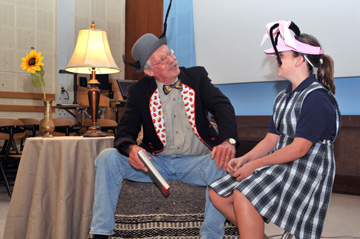Curriculum, creativity collide in science theater outreach

Tom Turpin, professor of entomology, tells the story of the "Insecta Class Yearbook" to a middle school student. The play is being performed by Purdue's Science Theater Outreach Program (STOP). (Photo by John Obermeyer)
What do Matilda Mosquito, Bartholomew "Barfy" Bee and Franz Firefly have in common? Well, they too survived the formative high school years, but their experience was unlike any other because they graduated from Bugville High.
The story of the six-legged teens is featured in "The Insecta Class Yearbook," a play performed by Purdue's Science Theater Outreach Program (STOP). In its inaugural year as a student organization, STOP has started to accept requests to take the play far from the borders of West Lafayette.
The traveling theater troupe began as the brainchild of Tom Turpin, professor of entomology. In Fall 2010, Turpin collaborated with education professor Marcia Gentry to instruct HONR 299, "Science, Education, and Theater: Inspiring Children and Their Teachers." Students in HONR 299 were responsible for writing, acting and constructing every aspect of the play, which they titled "The Insecta Class Yearbook." Their final exam was performing for the toughest crowd in the business -- a gymnasium full of children.
"Children are so much fun because they will tell you exactly what they think," Turpin says. "They laugh at some of the weirdest things and draw real connections between what is happening on stage and what happens in real life. We had great feedback from teachers who couldn't believe we entertained so many students for such a long period of time."
Following the initial success of HONR 299, Turpin helped form STOP. The purpose of the organization is to continue performing and adapting the plays first developed by the class.
This fall, the organization is performing "The Insecta Class Yearbook" on the road while also performing adaptations for various events on campus. Meanwhile, students currently enrolled in the class are creating scripts, props and set pieces for two new plays focusing on mathematics and chemistry. Following those debuts this winter, STOP will perform the math and chemistry plays as the class focuses on its next issue -- biodiversity. Many of the students are in both class and troupe.
"We have a lot of students actually re-enrolling in the academic class because they have such a great time developing the plays," Turpin says. "Since we change the curriculum focus each semester, the classwork is so dynamic that it's not like taking the same class again."
Turpin is no stranger to insect outreach for the Department of Entomology. The popular Bug Bowl, held during Purdue's annual Spring Fest, and Roachill Downs, a traveling cockroach raceway, both developed from Turpin's desire to connect with the community.
"Many of these ideas start when I get feedback from students or community members," Turpin says. "We hold one small event and have triple the anticipated participation and before you know it you have thousands of people."
Turpin is quick to point out the plays aren't only an educational experience but also a way to keep Purdue fresh in the minds of children on the brink of exploring college options.
"Some of the children we perform for are about to enter high school and make decisions that impact where they will go to college," Turpin says. "The shows we put on are created, planned and performed by Purdue students. Children get to see a small part of what college could be like for them."
Every show concludes with a question-and-answer session. On any given day, questions range from how to operate a puppet to more details on life at Purdue. Turpin says the Q-and-A session is one of the children's favorites because they get to have one-on-one interaction with college-age students.
"The teachers like us because we come in and integrate their curriculum into a fun and educational experience. The children like us because our students are coming in as peers, who sit down and talk to them after the show," Turpin says. "In the end, that's the most important thing -- getting children involved in learning."
